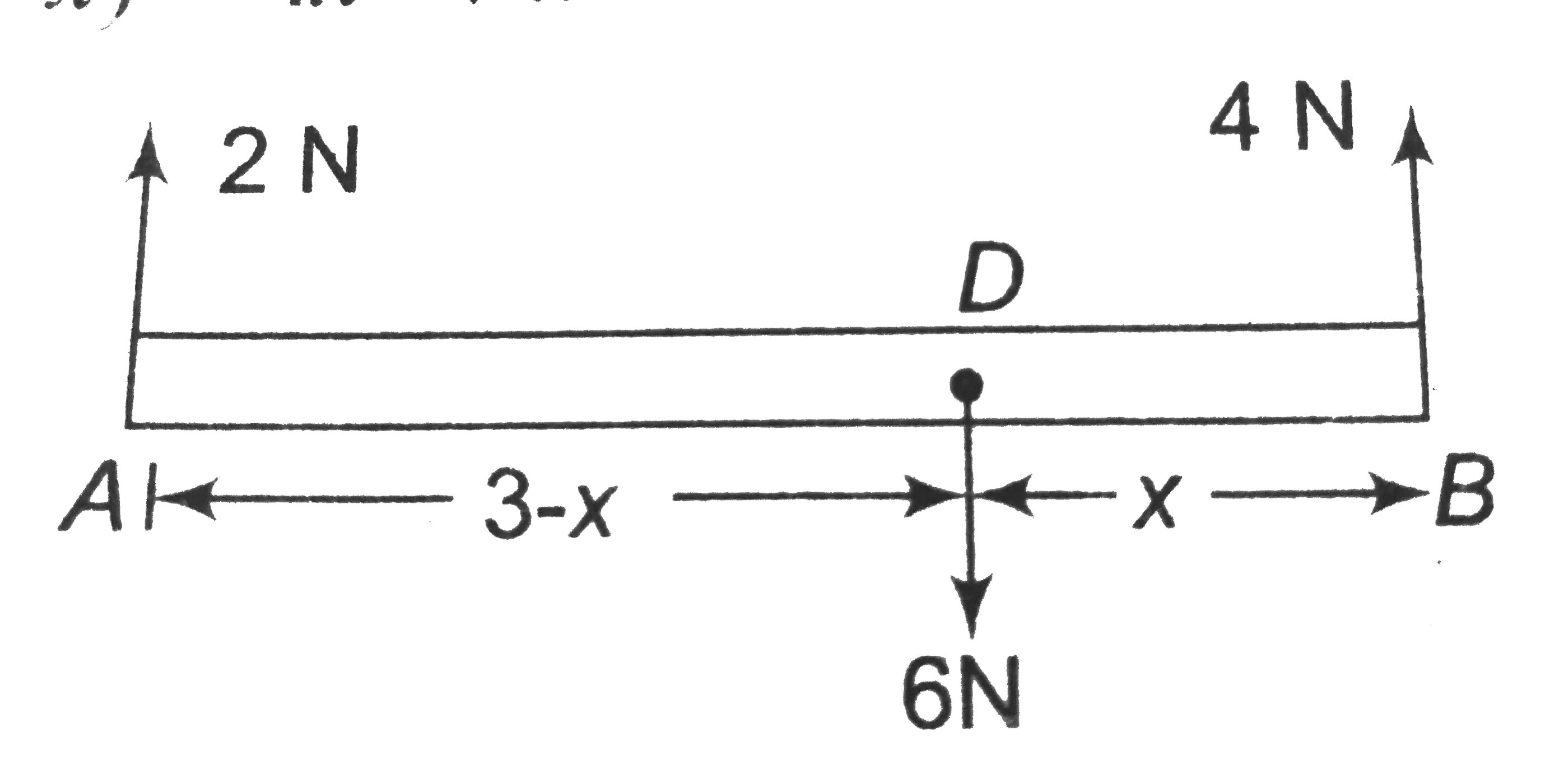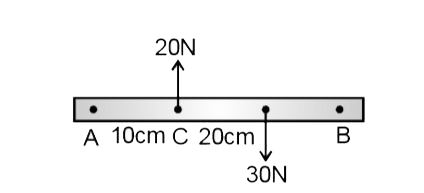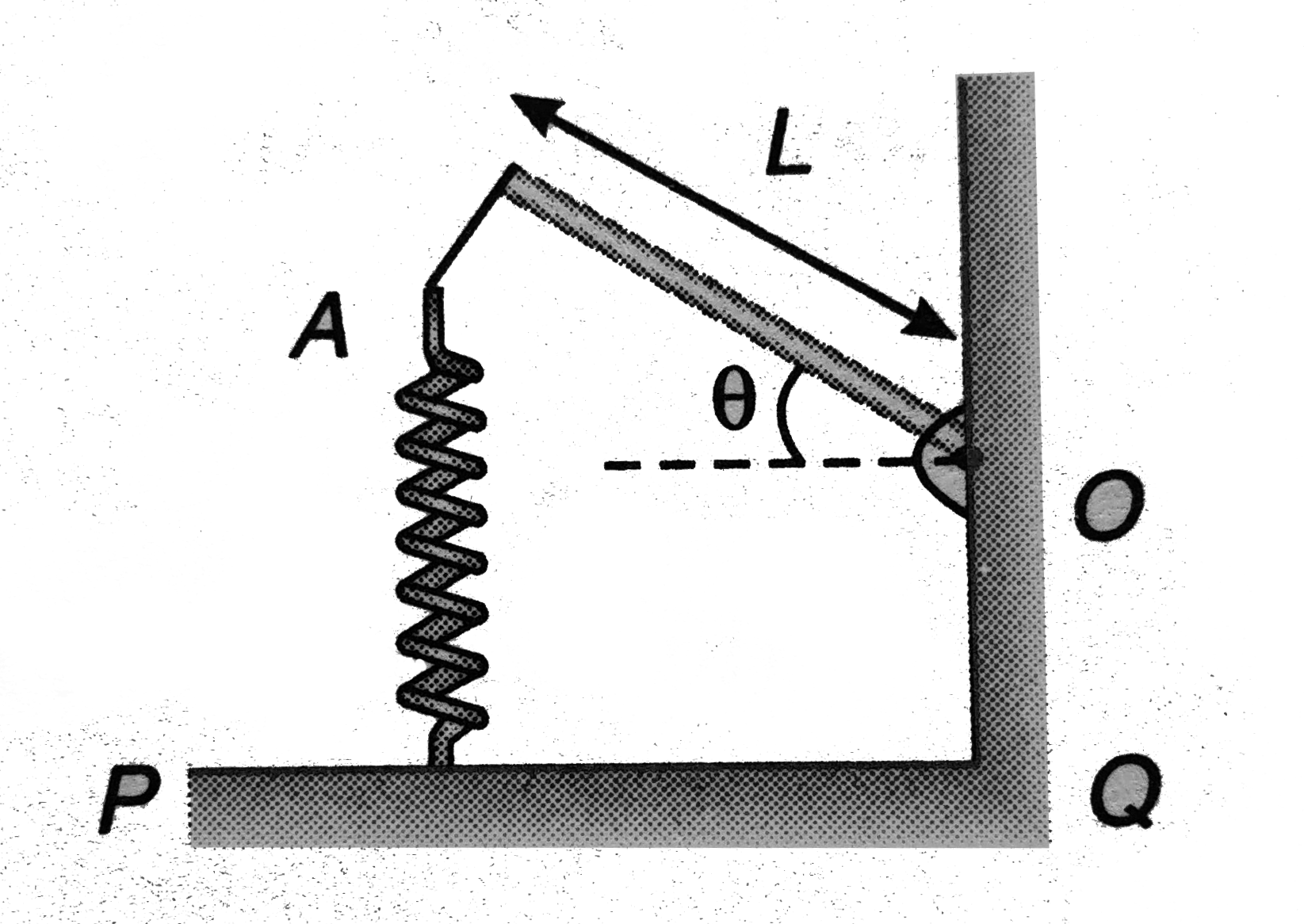A weightless rod is acted on by upward parallel forces of 2N and 4N ends A and B respectively. The total length of the rod AB=3m. To keep the rod in equilibrium a fo rce of 6N should act in the following manner :
Downwards at any point between A and B
Downwards at the mid point of AB
Downwards at a point C such that AC=1m
Downwards at a point D such that BD=1m.
The correct Answer is:D
(d) 2(3−x)=4x⇒x=1m.
 .
.
Topper's Solved these Questions
- ROTATIONAL DYNAMICSBook:A2ZChapter:ROTATIONAL DYNAMICSExercise:Angular Momentum And Its Conservation
Explore 30 Videos
- ROTATIONAL DYNAMICSBook:A2ZChapter:ROTATIONAL DYNAMICSExercise:Work And Energy In Case Of Rotation
Explore 22 Videos
- ROTATIONAL DYNAMICSBook:A2ZChapter:ROTATIONAL DYNAMICSExercise:Rotational Kinematics
Explore 19 Videos
- PROPERTIES OF MATTERBook:A2ZChapter:PROPERTIES OF MATTERExercise:Chapter Test
Explore 29 Videos
- THERMAL PROPERTIES OF MATTERBook:A2ZChapter:THERMAL PROPERTIES OF MATTERExercise:Chapter Test
Explore 30 Videos
Similar Questions
Determine the point of application of third force for which body is in equillibrium when forces of 20 N & 30 N are acting on the rod as shown in figure

View SolutionTwo parallel unlike forces of magnitudes 15 N and 10 N are acting at point A and B respectively. If C is the point of action of resultant, then AB/BC is
View Solution
Knowledge Check
A weightless rod is acted on by upward parallel forces of 2N and 4N ends A and B respectively. The total leng th of the rod AB=3m. To keep the rod in equilibrium a fo rce of 6N should act in the following manner :
Adownward at any point between A and BBdownward at the midpoint of ABCdownward at a point C such that AC=1 mDdownward at a point D such that BD=1mTwo like parallel force 20 N and 30 N act at the ands A and B of a rod 1.5 m long. The resultant of the forces will act at the point
A90 cm from AB75 cm from BC20 cm from BD85 cm from ATwo like parallel forces 5 Nand 15 N, act on a light rod at two points A and B respectively, 6 m apart. The resultant force and the distance of its point of action from the point A'are
A10N,4.5mB20N,4.5mC20N,1.5mD10N,1.5m
Two parallel unlike forces of magnitudes 15 N and 10 N are acting at point A and B respectively. If C is the point of action of resultant, then AB/BC is
View SolutionA long uniform rod of length L and mass M is free to rotate in a horizontal plane about a vertical axis through its one end 'O'. A spring of force constant k is connected between one end of the rod and PQ. When the rod is in equilibrium it is parallel to PQ.

(a)What is the period of small oscillation that result when the rod is rotated slightly and released ?
(b) What will be the maximum speed of the displacement end of the rod, if the amplitude of motion is θ0?
View SolutionFive forces 2N,√3N,5N,√3Nand2N respectively act at a particle P as shown in the fig
View SolutionA rod is free to rotate about its mid point. If the clockwise moments of 17 N m and 25 N m, respectively, are acting at the two ends of the rod, then the net moment acting on the rod is
View SolutionA rod of length L and mass M is acted on by two unequal forces F1 and F2(<F)as shown in the figure.

The tension in the rod at a distance y from the end A is given by
View Solution

